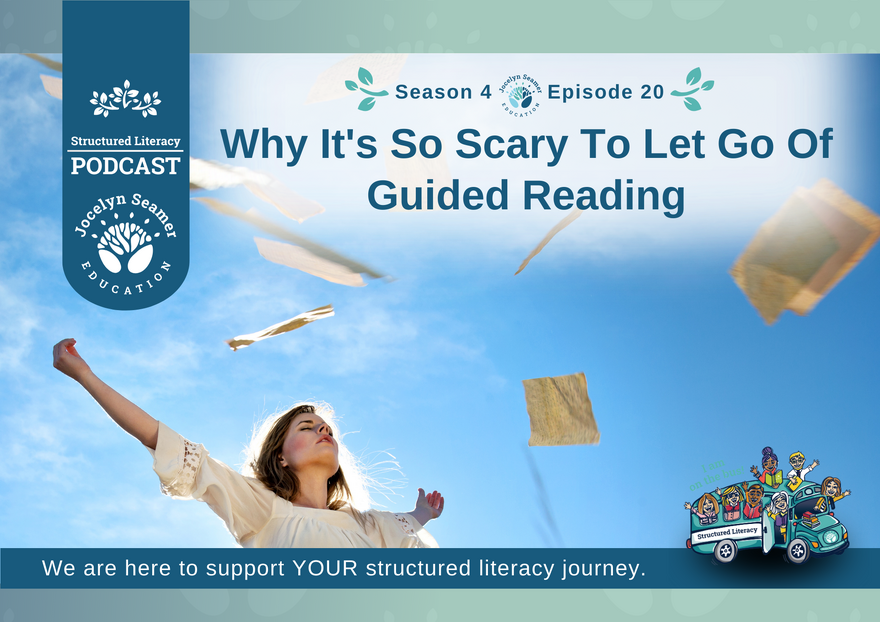S1 E6 - Why It's So Scary To Let Go Of Guided Reading

Moving from a guided reading small group approach to reading instruction means embracing a whole new literacy block structure. We are moving to one that seeks to maximize adult-led instructions, time on task, and the number of successful learning trials. And we are not doing this simply because it's the next shiny thing or because that's what someone told us. We are making this move to a more explicit approach because that's what the research tells us is the most effective way for all children, not just some of them.
When I share my suggestion for a literacy block, a common response initially is, "That looks achievable and simple, thanks." Because everything's kind of set out in low variance routines and it looks achievable. But then after a little bit of time and after people have given things a bit of a go, the feedback that I often receive is, "Look, it's great, but I still can't get my head around it. Maybe I might need some sort of a different outline."
"I can't get my head around it" comes about because writing a literacy block outline into your planner is easy. It's easy to say, I'm going to teach a phonics lesson here and work with a text-based unit there, and this is where we'll be doing our partner reading with our texts. Writing it into the block is the easy bit. Achieving enough automaticity and fluency with all of the elements of the block so that we feel like we're in our comfort zone is a whole different thing. Moving away from guided reading (that we may have spent years organizing and refining) might make intellectual sense, but it's also going to result in a temporary loss of teaching mojo. This feeling of being lost, uncomfortable, nervous, overwhelmed, or frankly downright scared is not a sign that you need a new program or you should retreat from your path. It's a sign that you are learning something new that is taking you out of your comfort zone.
And the first thing that I want to say is that your feelings aren't about having a bad attitude or a lack of commitment. Feeling uncertain doesn't mean you're a bad teacher. The feelings are about cognitive load and our brain's wiring that is designed to keep us safe. Just as with learning to jump off a high board at the pool, changing practice will be approached differently by different people. Some people will climb right up to the 10-meter board and just jump off squealing with delight all the way down and then say, oh, can I do it again? And others will need to take things much more slowly, gradually increasing the height of the board that they jump off over time with lots of encouragement and lots of feedback.
The mindsets that can get in the way of shifting practice
1) How do I make sure that everybody's actually reading if I'm not working with them in a small group?
Decodable texts are designed to set everyone up for success. So when we were working with our levelled text, and we were teaching our three queuing, the reason that the children needed us to be there in such close proximity, is because they couldn't actually decode what was on the page. They needed us to guide them, through using really inefficient strategies. When we use a decodable text that is aligned with the phonics the children know and their phonemic stamina, our children are set up for success. They can actually access the text in front of them, and with the support of a partner who's there to help them if they stumble.
2) When do I teach comprehension if we aren't in a small group?
The mindset shift around this is that we are not actually teaching comprehension strategies using those simple texts. Comprehension comes about through building vocabulary, background knowledge, and yes, through the application of comprehension strategies but all in the context of a rich text that we teach with whole class during our text-based work.
3) Decodables are not rich text
Then there's the one about decodables are not rich text so children will not like them, will be bored, and will lose a love of reading if they are made to read them. Even if we know that this isn't true, there's still that worry in us. I am here to reassure you that decodables are not supposed to be rich texts. That the engagement and enjoyment that children get out of them is being able to read them. It's being successful in the reading.
4) Won't children be bored by all that teacher-led explicit learning?
I often hear that children will be bored by all that teacher-led explicit learning. We are led to believe that explicit teaching has children sitting like automatons, parroting things back to the teacher, that there's no opportunity for them to have voice or choice or engagement or get excited about learning, and it's simply not true. High-quality, explicit teaching is incredibly engaging. In fact, I think it's more engaging because every child is participating through established norms that help everybody feel safe. And when the teacher is leading the experience, they are building success every step of the way so that children can feel and be successful and have that beautiful little chemical hit in their brain that rewards them when they achieve. Explicit teaching does not alienate children from the learning process, but until you see it in action, it can be hard to imagine what this thing is going to look like.
In Conclusion
Making the shift to a structured literacy block can leave us feeling out of our comfort zone, but understanding that it's not our knowledge of what goes into the block, but our brain's natural reaction to change in new things that causes this sense of being lost or nervous can really help put things into perspective. We've all heard that language about the power of yet. Instead of, "I don't feel confident with partner reading.", we can try "I don't feel confident with partner reading yet." I know that sounds like a cliché and it might sound like an oversimplification, but it works.
All we need to do is take small steps and like the children with their reading, practice them so that we have increased automaticity and increased fluency. When we do that, our comfort zone expands. It's only terrifying the first time you do it. The next time you have a little bit more idea of what to do and the time after that, a little bit more again.
Looking for simple tools and loads of support to teach using structured literacy? If so, The Resource Room is for you. Learn more here.

 Jocelyn Seamer Education
Jocelyn Seamer Education
2 comments
Thank you for answering the many questions about guided reading. It is such a hot topic! I loved the explanation of how the brain experiences fear. It makes sense!! Although... I would still not like to go on a rollercoaster!!
Leave a comment